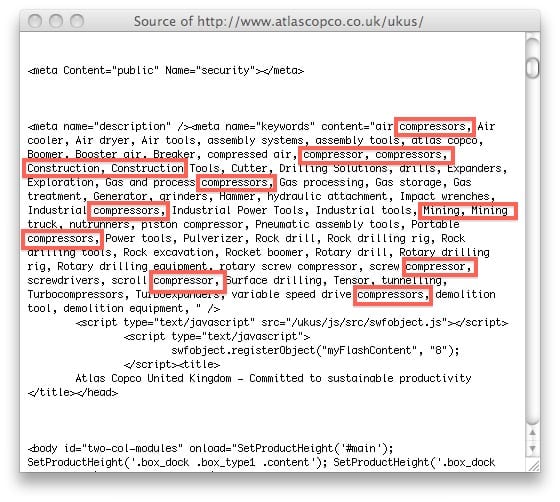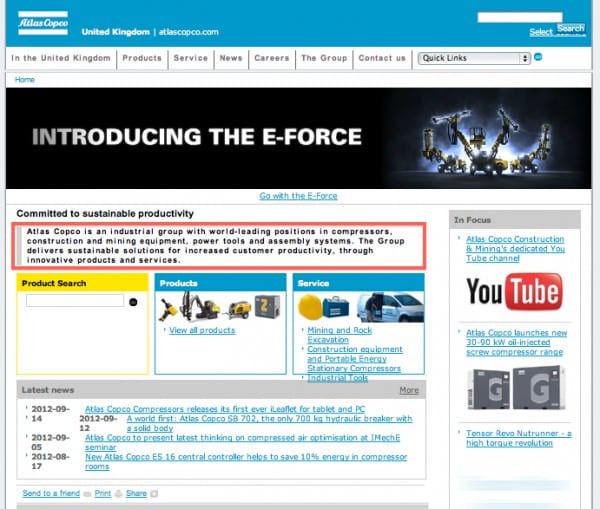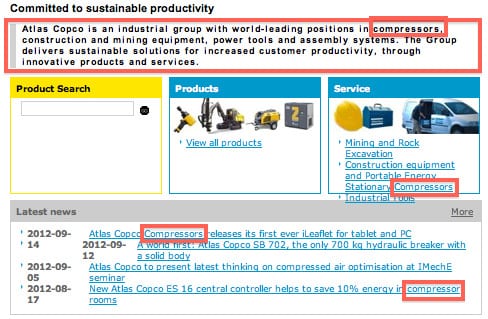Understanding the significance of search enables commercially-minded business marketers to construct websites that rise to the top just when prospects and customers are looking for them.
Think about your own information searches online. You use words and alter them, add to them or remove them to better refine the results you receive. Having a search engine optimisation strategy for your business helps to provide a structured approach to identifying the words that your customer and prospects use to then position your products and services to meet their needs. This is achieved by improving your visibility in search engines for the most relevant queries that people are using. If you are interesting and relevant enough, they may take an action to find out more.
Using an industrial b2b example, the mining products company Atlas Copco, we can see how a structured approach to on page optimisation can pay dividends.
Keywords
Keywords are critical as they drive your messaging, content and success in search marketing. It’s important that there is a relationship between how your site is written and what browsers are looking for but it is very common for businesses to either do too little or too much which leads to keyword stuffing.
Keyword research
Keyword research involves mapping what your customers and prospects are looking for and what you can offer them. There is data available to give some insight into which words and phrases are used more frequently than others and a measure of the relative competition in trying to rank top on them. It is an exercise in predicting what users want based on a query they are performing in a search engine.
Keyword research can be an involved and complicated process if you are promoting a number of elements simultaneously. For the purposes of this post, the sorts of headline requirements that you should be considering from a business marketing perspective include:
Focus of the page.
Are you providing information or overtly selling? This plays on the position and mindset of the visitor in relation to where they are in the buying cycle. The words, language and tone change markedly from informational pages to product selling pages.
Pick a primary keyword for each page.
Consider using a small number of keywords across your website to start. Using too many on a page will dilute the impact of individual words and mean the page has little authority when assessed by search engines.
Assess the competition.
What are the competition doing with keywords and are some more prevalent than others? A simple right click and View Source will display the company’s keywords included in their meta data. Consider, though, that they may have the mood very wrong. They may have their business, products or services positioned incorrectly for the audience. In an online environment, your competition becomes those sites that are vying for rankings for the same keyword phrase.

Use a keyword analysis tool. Free tools like the Google Adword tool are perfect for initial research and help to establish the relative relevance and value of keywords, giving an indication of searches over time and regionally, and refining selection.
Using keywords in practice
The first 200 words are generally accepted as the most important. Make sure the keywords for your page are placed in the first few sentences and also in the first heading (H1) tag on the page and consistently referenced throughout.

Headline placement.
Place your primary keywords in your headings and sub-headings as these areas of content have greater weight in search engine ranking algorithms.
Include clarification words.
Sometimes if there are words with more than one meaning, it makes sense to use additional words to clarify the intended meaning. To help the search engine bot establish the meaning, use a ~keyword search in Google’s search bar. The results will have the words in bold that the search engine believes are most related to that word. This turns keywords into keyphrases or ‘long tail’ as it is more commonly used. Increasingly Internet users are using three words to refine their search so your SEO should follow suit. These ‘qualifiers’ are delivered through Google Suggest.

Check keyword density and distribution.
You don’t want to use keywords too much in your displayed ‘on-page’ content, but you do want to make sure they are used at least twice in the body copy as an absolute minimum. Reference needs to be natural and within context. A keyword in every sentence looks forced. Ask your copywriters to use synonyms.

Mistakes to avoid
1. Having your brand name as the first thing in your page title.
Use your key phrases first and add your brand on at the end.
2. Using too many keyphrases in the title.
Keep your title short, sweet and simple.
3. Having lots of pages with the same title.
Ensure each page title is used to its full potential, make sure each page is targeting a relevant keyphrase and be careful not to duplicate titles which may mean Google thinks your pages are similar and it won’t include them all in the index.
4. The page title doesn’t make sense.
Page titles have to read well and should make sense to your customers.
5. Not regularly checking titles or click-through rates.
Often e-commerce sites will use automated page titles, system-generated based on business rules. However, technology can fail and if there is an issue with this auto-generation, you could end up with erroneous page titles. Always do regular checks to make sure search engines are showing what you want them to.
There are lots of other ways to improve the on page optimisation of your page. What are your top tips?










